Study Skills for Higher Education: An Essay on Academic Writing
VerifiedAdded on 2023/06/18
|8
|1885
|140
Essay
AI Summary
This essay provides an overview of the key features of academic writing, essential for success in higher education. It discusses seven fundamental aspects: structure, evidence, critical writing, balance, precision, objectivity, and formality. The essay emphasizes the importance of each feature, explaining how they contribute to clear, credible, and effective academic communication. Structure involves organizing content into a logical introduction, body, and conclusion, supported by elements like a title, abstract, and references. Evidence requires backing claims with facts, data, and scholarly sources. Critical writing involves analyzing and interpreting arguments, while balance ensures unbiased consideration of all sides of an issue. Precision demands clear and unambiguous language, and objectivity calls for neutral presentation of facts without personal opinions. Finally, formality requires using complex sentences and avoiding colloquialisms. The report concludes that adhering to these features enables writers to convey ideas effectively and build trust with readers. Desklib offers a wealth of similar academic resources for students.
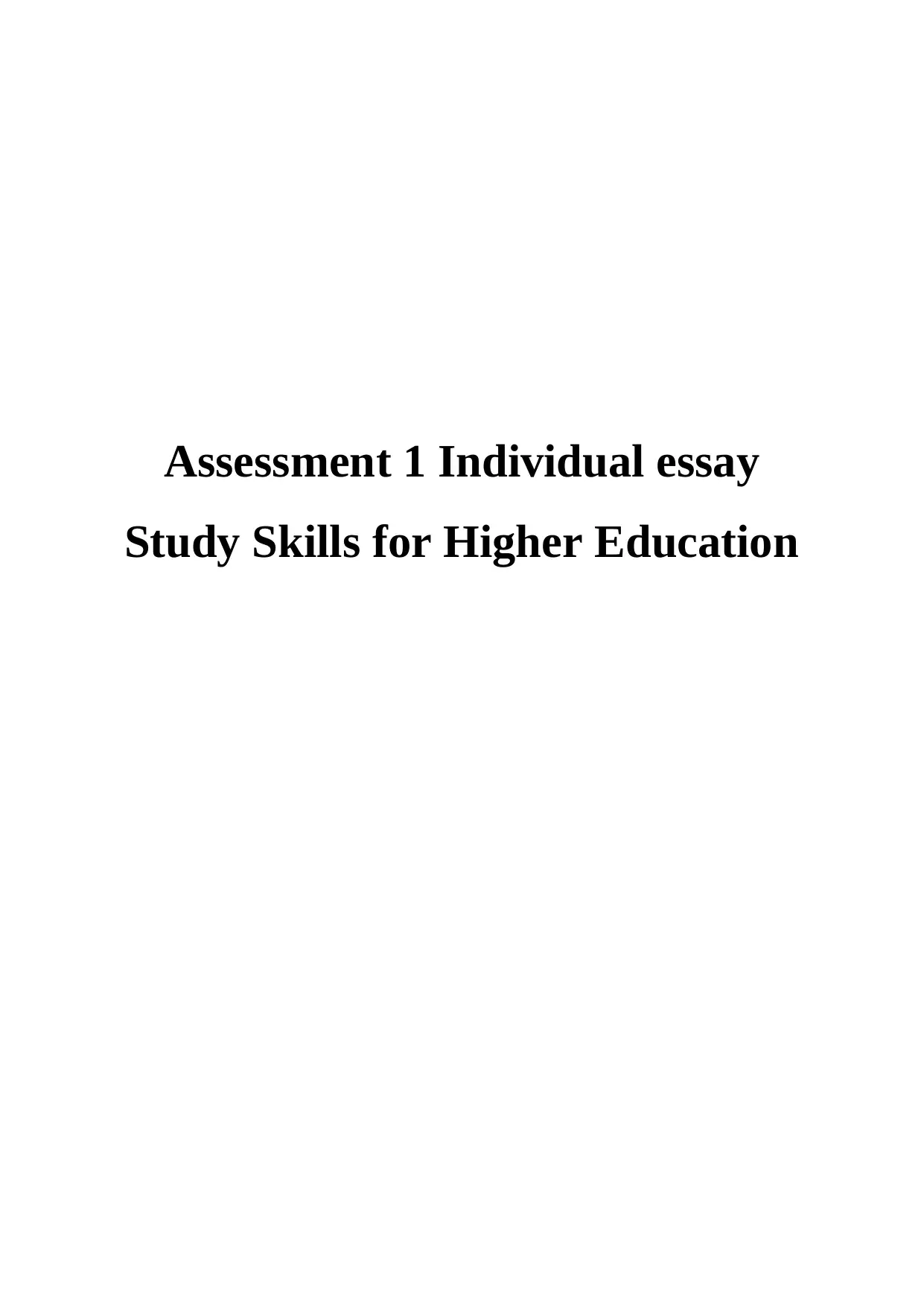
Assessment 1 Individual essay
Study Skills for Higher Education
Study Skills for Higher Education
Paraphrase This Document
Need a fresh take? Get an instant paraphrase of this document with our AI Paraphraser
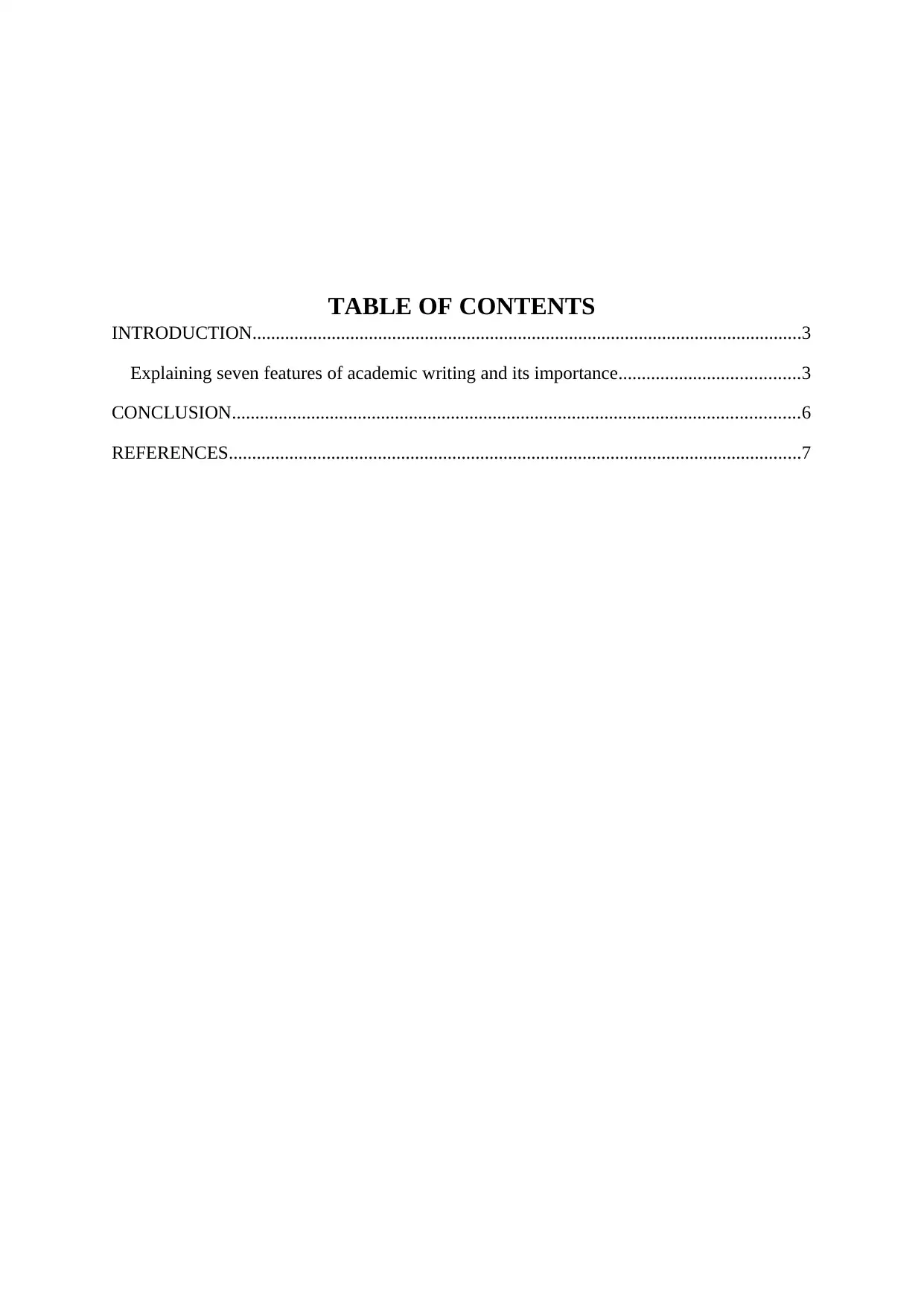
TABLE OF CONTENTS
INTRODUCTION......................................................................................................................3
Explaining seven features of academic writing and its importance.......................................3
CONCLUSION..........................................................................................................................6
REFERENCES...........................................................................................................................7
INTRODUCTION......................................................................................................................3
Explaining seven features of academic writing and its importance.......................................3
CONCLUSION..........................................................................................................................6
REFERENCES...........................................................................................................................7
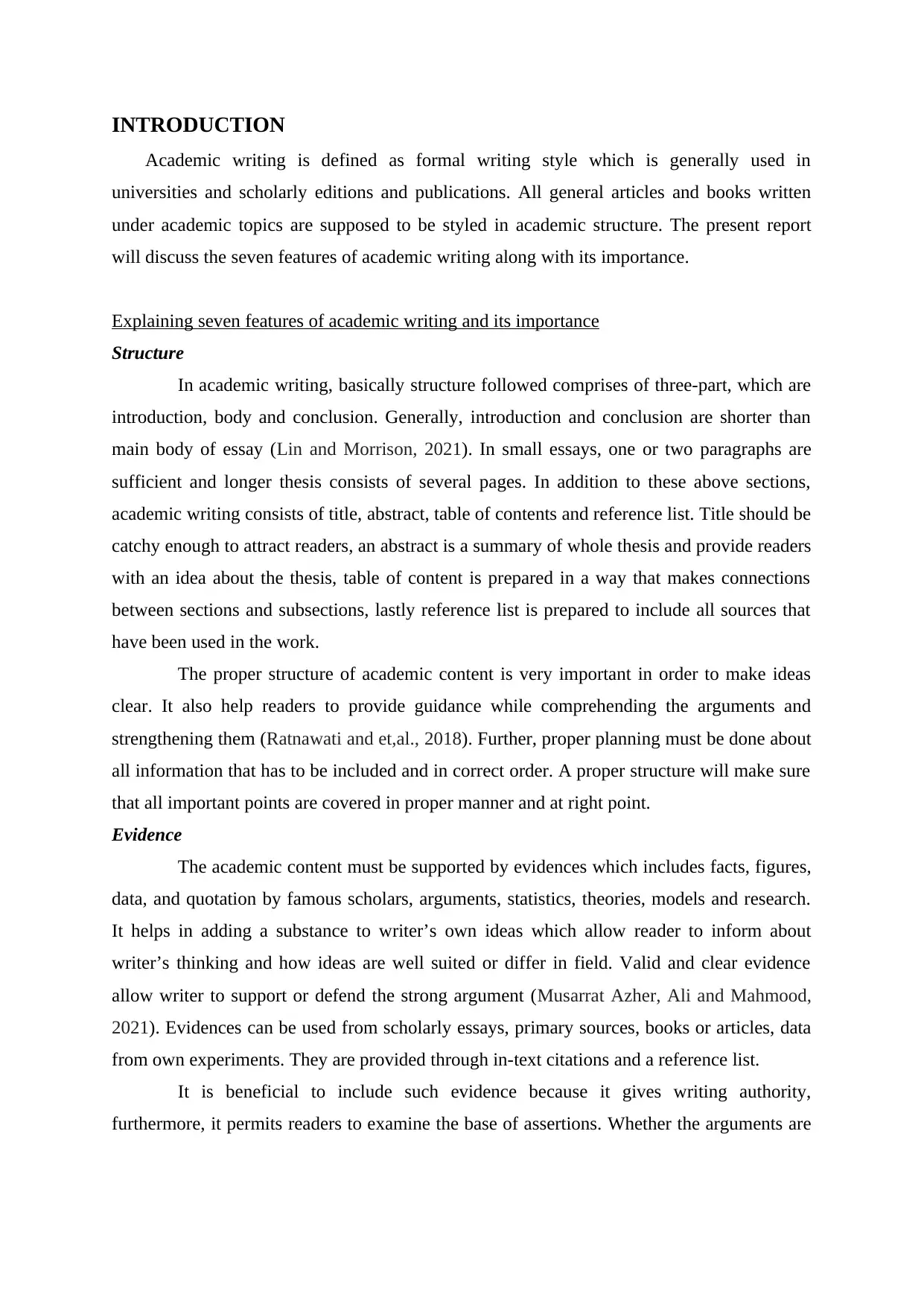
INTRODUCTION
Academic writing is defined as formal writing style which is generally used in
universities and scholarly editions and publications. All general articles and books written
under academic topics are supposed to be styled in academic structure. The present report
will discuss the seven features of academic writing along with its importance.
Explaining seven features of academic writing and its importance
Structure
In academic writing, basically structure followed comprises of three-part, which are
introduction, body and conclusion. Generally, introduction and conclusion are shorter than
main body of essay (Lin and Morrison, 2021). In small essays, one or two paragraphs are
sufficient and longer thesis consists of several pages. In addition to these above sections,
academic writing consists of title, abstract, table of contents and reference list. Title should be
catchy enough to attract readers, an abstract is a summary of whole thesis and provide readers
with an idea about the thesis, table of content is prepared in a way that makes connections
between sections and subsections, lastly reference list is prepared to include all sources that
have been used in the work.
The proper structure of academic content is very important in order to make ideas
clear. It also help readers to provide guidance while comprehending the arguments and
strengthening them (Ratnawati and et,al., 2018). Further, proper planning must be done about
all information that has to be included and in correct order. A proper structure will make sure
that all important points are covered in proper manner and at right point.
Evidence
The academic content must be supported by evidences which includes facts, figures,
data, and quotation by famous scholars, arguments, statistics, theories, models and research.
It helps in adding a substance to writer’s own ideas which allow reader to inform about
writer’s thinking and how ideas are well suited or differ in field. Valid and clear evidence
allow writer to support or defend the strong argument (Musarrat Azher, Ali and Mahmood,
2021). Evidences can be used from scholarly essays, primary sources, books or articles, data
from own experiments. They are provided through in-text citations and a reference list.
It is beneficial to include such evidence because it gives writing authority,
furthermore, it permits readers to examine the base of assertions. Whether the arguments are
Academic writing is defined as formal writing style which is generally used in
universities and scholarly editions and publications. All general articles and books written
under academic topics are supposed to be styled in academic structure. The present report
will discuss the seven features of academic writing along with its importance.
Explaining seven features of academic writing and its importance
Structure
In academic writing, basically structure followed comprises of three-part, which are
introduction, body and conclusion. Generally, introduction and conclusion are shorter than
main body of essay (Lin and Morrison, 2021). In small essays, one or two paragraphs are
sufficient and longer thesis consists of several pages. In addition to these above sections,
academic writing consists of title, abstract, table of contents and reference list. Title should be
catchy enough to attract readers, an abstract is a summary of whole thesis and provide readers
with an idea about the thesis, table of content is prepared in a way that makes connections
between sections and subsections, lastly reference list is prepared to include all sources that
have been used in the work.
The proper structure of academic content is very important in order to make ideas
clear. It also help readers to provide guidance while comprehending the arguments and
strengthening them (Ratnawati and et,al., 2018). Further, proper planning must be done about
all information that has to be included and in correct order. A proper structure will make sure
that all important points are covered in proper manner and at right point.
Evidence
The academic content must be supported by evidences which includes facts, figures,
data, and quotation by famous scholars, arguments, statistics, theories, models and research.
It helps in adding a substance to writer’s own ideas which allow reader to inform about
writer’s thinking and how ideas are well suited or differ in field. Valid and clear evidence
allow writer to support or defend the strong argument (Musarrat Azher, Ali and Mahmood,
2021). Evidences can be used from scholarly essays, primary sources, books or articles, data
from own experiments. They are provided through in-text citations and a reference list.
It is beneficial to include such evidence because it gives writing authority,
furthermore, it permits readers to examine the base of assertions. Whether the arguments are
⊘ This is a preview!⊘
Do you want full access?
Subscribe today to unlock all pages.

Trusted by 1+ million students worldwide
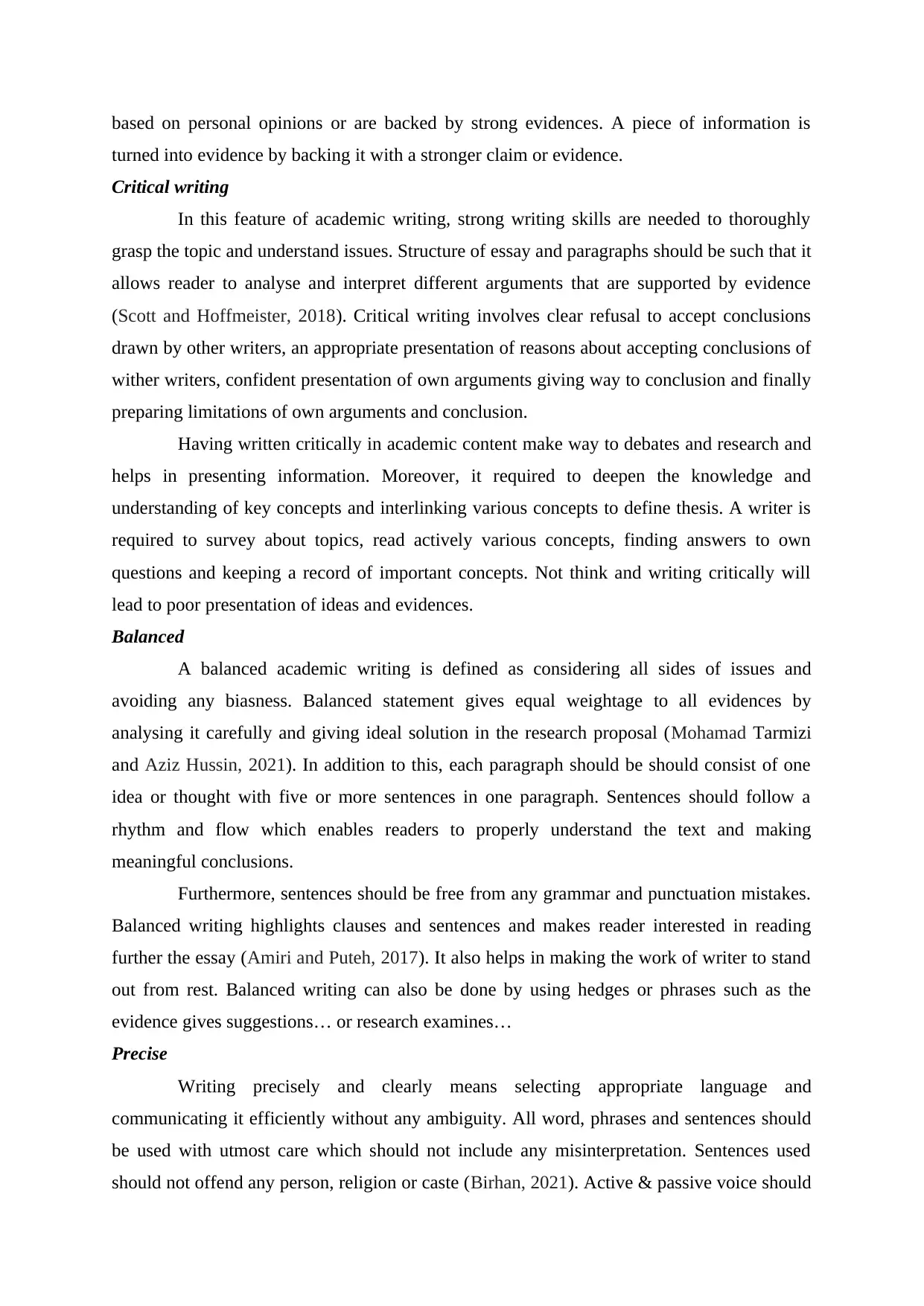
based on personal opinions or are backed by strong evidences. A piece of information is
turned into evidence by backing it with a stronger claim or evidence.
Critical writing
In this feature of academic writing, strong writing skills are needed to thoroughly
grasp the topic and understand issues. Structure of essay and paragraphs should be such that it
allows reader to analyse and interpret different arguments that are supported by evidence
(Scott and Hoffmeister, 2018). Critical writing involves clear refusal to accept conclusions
drawn by other writers, an appropriate presentation of reasons about accepting conclusions of
wither writers, confident presentation of own arguments giving way to conclusion and finally
preparing limitations of own arguments and conclusion.
Having written critically in academic content make way to debates and research and
helps in presenting information. Moreover, it required to deepen the knowledge and
understanding of key concepts and interlinking various concepts to define thesis. A writer is
required to survey about topics, read actively various concepts, finding answers to own
questions and keeping a record of important concepts. Not think and writing critically will
lead to poor presentation of ideas and evidences.
Balanced
A balanced academic writing is defined as considering all sides of issues and
avoiding any biasness. Balanced statement gives equal weightage to all evidences by
analysing it carefully and giving ideal solution in the research proposal (Mohamad Tarmizi
and Aziz Hussin, 2021). In addition to this, each paragraph should be should consist of one
idea or thought with five or more sentences in one paragraph. Sentences should follow a
rhythm and flow which enables readers to properly understand the text and making
meaningful conclusions.
Furthermore, sentences should be free from any grammar and punctuation mistakes.
Balanced writing highlights clauses and sentences and makes reader interested in reading
further the essay (Amiri and Puteh, 2017). It also helps in making the work of writer to stand
out from rest. Balanced writing can also be done by using hedges or phrases such as the
evidence gives suggestions… or research examines…
Precise
Writing precisely and clearly means selecting appropriate language and
communicating it efficiently without any ambiguity. All word, phrases and sentences should
be used with utmost care which should not include any misinterpretation. Sentences used
should not offend any person, religion or caste (Birhan, 2021). Active & passive voice should
turned into evidence by backing it with a stronger claim or evidence.
Critical writing
In this feature of academic writing, strong writing skills are needed to thoroughly
grasp the topic and understand issues. Structure of essay and paragraphs should be such that it
allows reader to analyse and interpret different arguments that are supported by evidence
(Scott and Hoffmeister, 2018). Critical writing involves clear refusal to accept conclusions
drawn by other writers, an appropriate presentation of reasons about accepting conclusions of
wither writers, confident presentation of own arguments giving way to conclusion and finally
preparing limitations of own arguments and conclusion.
Having written critically in academic content make way to debates and research and
helps in presenting information. Moreover, it required to deepen the knowledge and
understanding of key concepts and interlinking various concepts to define thesis. A writer is
required to survey about topics, read actively various concepts, finding answers to own
questions and keeping a record of important concepts. Not think and writing critically will
lead to poor presentation of ideas and evidences.
Balanced
A balanced academic writing is defined as considering all sides of issues and
avoiding any biasness. Balanced statement gives equal weightage to all evidences by
analysing it carefully and giving ideal solution in the research proposal (Mohamad Tarmizi
and Aziz Hussin, 2021). In addition to this, each paragraph should be should consist of one
idea or thought with five or more sentences in one paragraph. Sentences should follow a
rhythm and flow which enables readers to properly understand the text and making
meaningful conclusions.
Furthermore, sentences should be free from any grammar and punctuation mistakes.
Balanced writing highlights clauses and sentences and makes reader interested in reading
further the essay (Amiri and Puteh, 2017). It also helps in making the work of writer to stand
out from rest. Balanced writing can also be done by using hedges or phrases such as the
evidence gives suggestions… or research examines…
Precise
Writing precisely and clearly means selecting appropriate language and
communicating it efficiently without any ambiguity. All word, phrases and sentences should
be used with utmost care which should not include any misinterpretation. Sentences used
should not offend any person, religion or caste (Birhan, 2021). Active & passive voice should
Paraphrase This Document
Need a fresh take? Get an instant paraphrase of this document with our AI Paraphraser
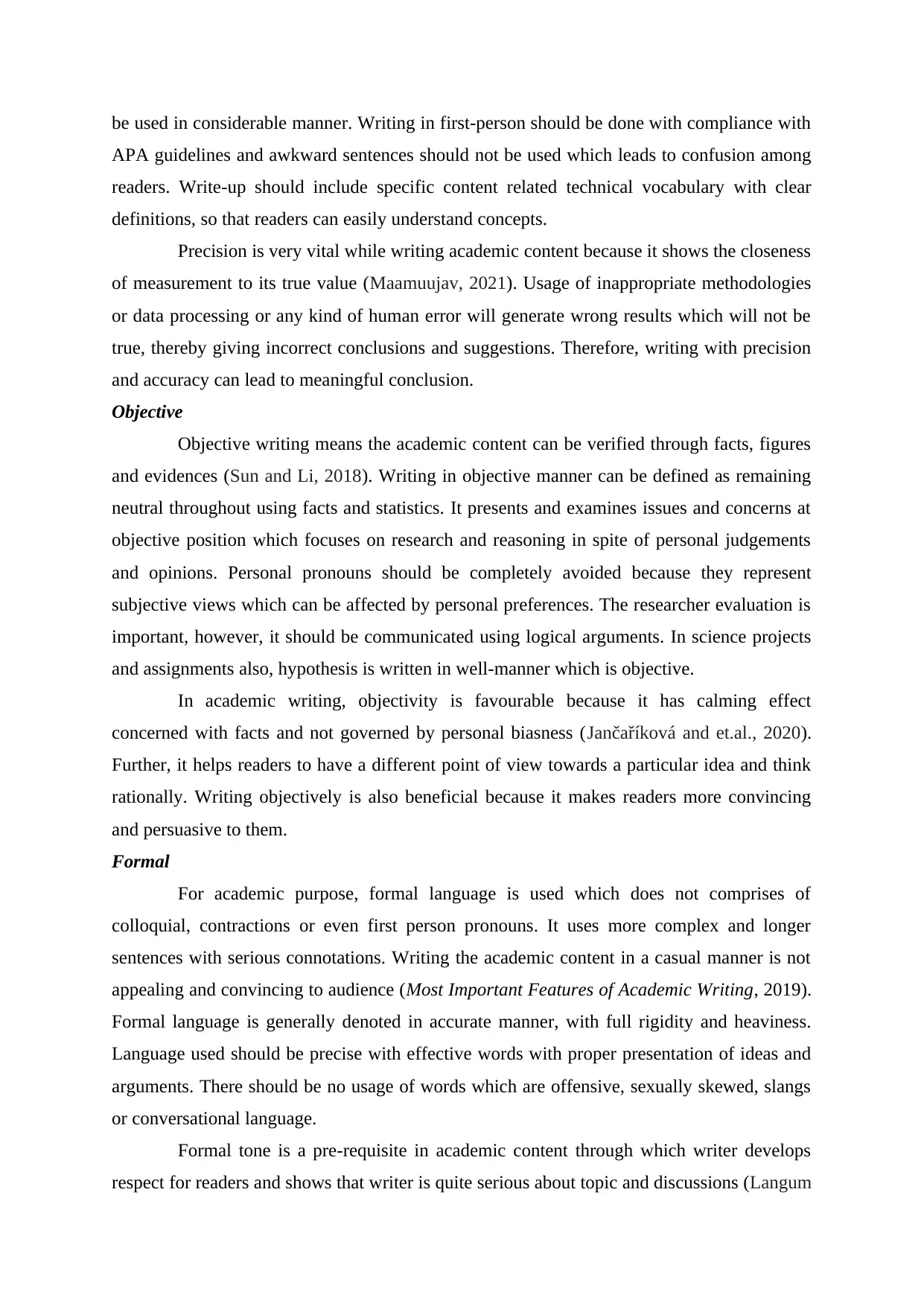
be used in considerable manner. Writing in first-person should be done with compliance with
APA guidelines and awkward sentences should not be used which leads to confusion among
readers. Write-up should include specific content related technical vocabulary with clear
definitions, so that readers can easily understand concepts.
Precision is very vital while writing academic content because it shows the closeness
of measurement to its true value (Maamuujav, 2021). Usage of inappropriate methodologies
or data processing or any kind of human error will generate wrong results which will not be
true, thereby giving incorrect conclusions and suggestions. Therefore, writing with precision
and accuracy can lead to meaningful conclusion.
Objective
Objective writing means the academic content can be verified through facts, figures
and evidences (Sun and Li, 2018). Writing in objective manner can be defined as remaining
neutral throughout using facts and statistics. It presents and examines issues and concerns at
objective position which focuses on research and reasoning in spite of personal judgements
and opinions. Personal pronouns should be completely avoided because they represent
subjective views which can be affected by personal preferences. The researcher evaluation is
important, however, it should be communicated using logical arguments. In science projects
and assignments also, hypothesis is written in well-manner which is objective.
In academic writing, objectivity is favourable because it has calming effect
concerned with facts and not governed by personal biasness (Jančaříková and et.al., 2020).
Further, it helps readers to have a different point of view towards a particular idea and think
rationally. Writing objectively is also beneficial because it makes readers more convincing
and persuasive to them.
Formal
For academic purpose, formal language is used which does not comprises of
colloquial, contractions or even first person pronouns. It uses more complex and longer
sentences with serious connotations. Writing the academic content in a casual manner is not
appealing and convincing to audience (Most Important Features of Academic Writing, 2019).
Formal language is generally denoted in accurate manner, with full rigidity and heaviness.
Language used should be precise with effective words with proper presentation of ideas and
arguments. There should be no usage of words which are offensive, sexually skewed, slangs
or conversational language.
Formal tone is a pre-requisite in academic content through which writer develops
respect for readers and shows that writer is quite serious about topic and discussions (Langum
APA guidelines and awkward sentences should not be used which leads to confusion among
readers. Write-up should include specific content related technical vocabulary with clear
definitions, so that readers can easily understand concepts.
Precision is very vital while writing academic content because it shows the closeness
of measurement to its true value (Maamuujav, 2021). Usage of inappropriate methodologies
or data processing or any kind of human error will generate wrong results which will not be
true, thereby giving incorrect conclusions and suggestions. Therefore, writing with precision
and accuracy can lead to meaningful conclusion.
Objective
Objective writing means the academic content can be verified through facts, figures
and evidences (Sun and Li, 2018). Writing in objective manner can be defined as remaining
neutral throughout using facts and statistics. It presents and examines issues and concerns at
objective position which focuses on research and reasoning in spite of personal judgements
and opinions. Personal pronouns should be completely avoided because they represent
subjective views which can be affected by personal preferences. The researcher evaluation is
important, however, it should be communicated using logical arguments. In science projects
and assignments also, hypothesis is written in well-manner which is objective.
In academic writing, objectivity is favourable because it has calming effect
concerned with facts and not governed by personal biasness (Jančaříková and et.al., 2020).
Further, it helps readers to have a different point of view towards a particular idea and think
rationally. Writing objectively is also beneficial because it makes readers more convincing
and persuasive to them.
Formal
For academic purpose, formal language is used which does not comprises of
colloquial, contractions or even first person pronouns. It uses more complex and longer
sentences with serious connotations. Writing the academic content in a casual manner is not
appealing and convincing to audience (Most Important Features of Academic Writing, 2019).
Formal language is generally denoted in accurate manner, with full rigidity and heaviness.
Language used should be precise with effective words with proper presentation of ideas and
arguments. There should be no usage of words which are offensive, sexually skewed, slangs
or conversational language.
Formal tone is a pre-requisite in academic content through which writer develops
respect for readers and shows that writer is quite serious about topic and discussions (Langum
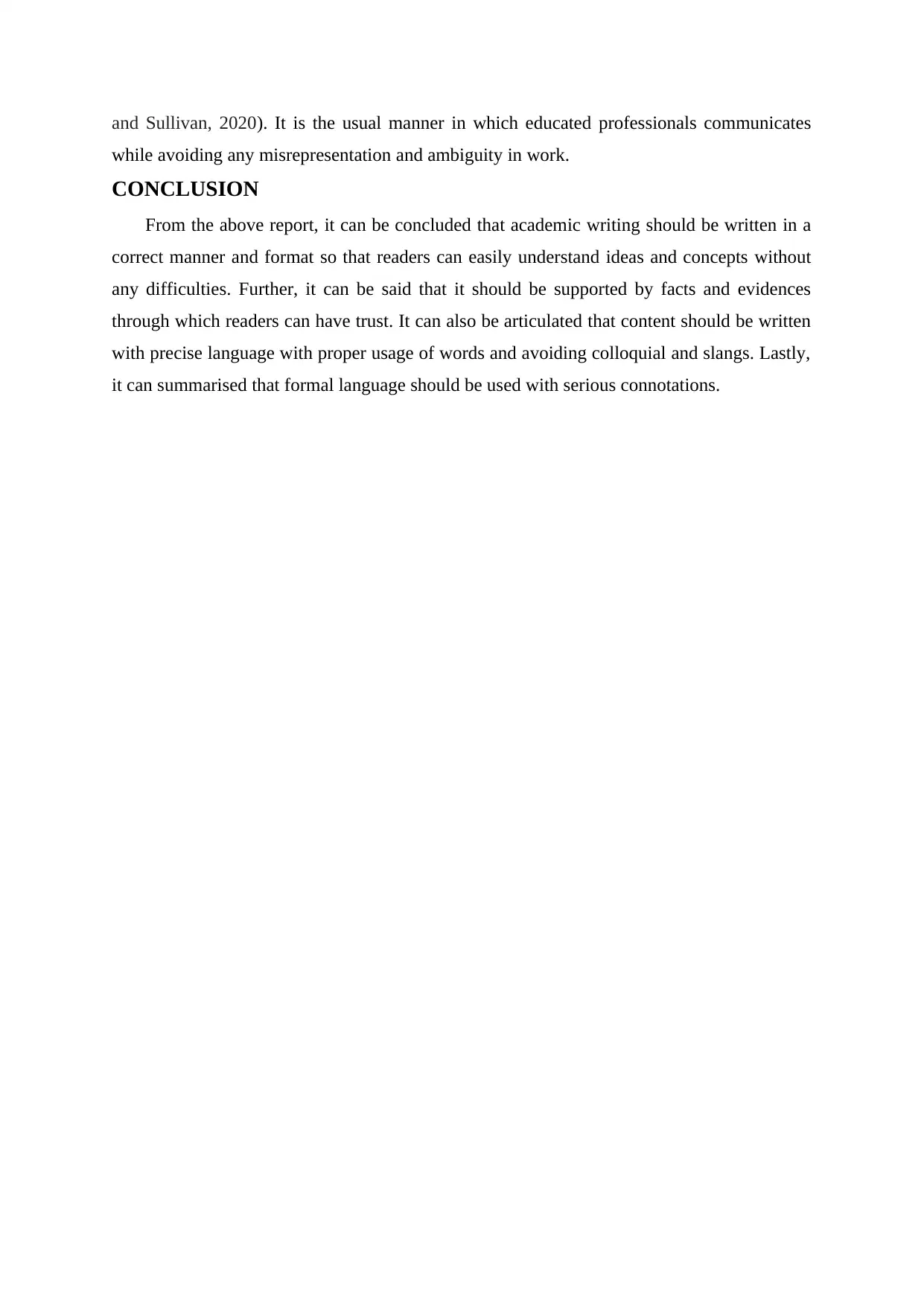
and Sullivan, 2020). It is the usual manner in which educated professionals communicates
while avoiding any misrepresentation and ambiguity in work.
CONCLUSION
From the above report, it can be concluded that academic writing should be written in a
correct manner and format so that readers can easily understand ideas and concepts without
any difficulties. Further, it can be said that it should be supported by facts and evidences
through which readers can have trust. It can also be articulated that content should be written
with precise language with proper usage of words and avoiding colloquial and slangs. Lastly,
it can summarised that formal language should be used with serious connotations.
while avoiding any misrepresentation and ambiguity in work.
CONCLUSION
From the above report, it can be concluded that academic writing should be written in a
correct manner and format so that readers can easily understand ideas and concepts without
any difficulties. Further, it can be said that it should be supported by facts and evidences
through which readers can have trust. It can also be articulated that content should be written
with precise language with proper usage of words and avoiding colloquial and slangs. Lastly,
it can summarised that formal language should be used with serious connotations.
⊘ This is a preview!⊘
Do you want full access?
Subscribe today to unlock all pages.

Trusted by 1+ million students worldwide
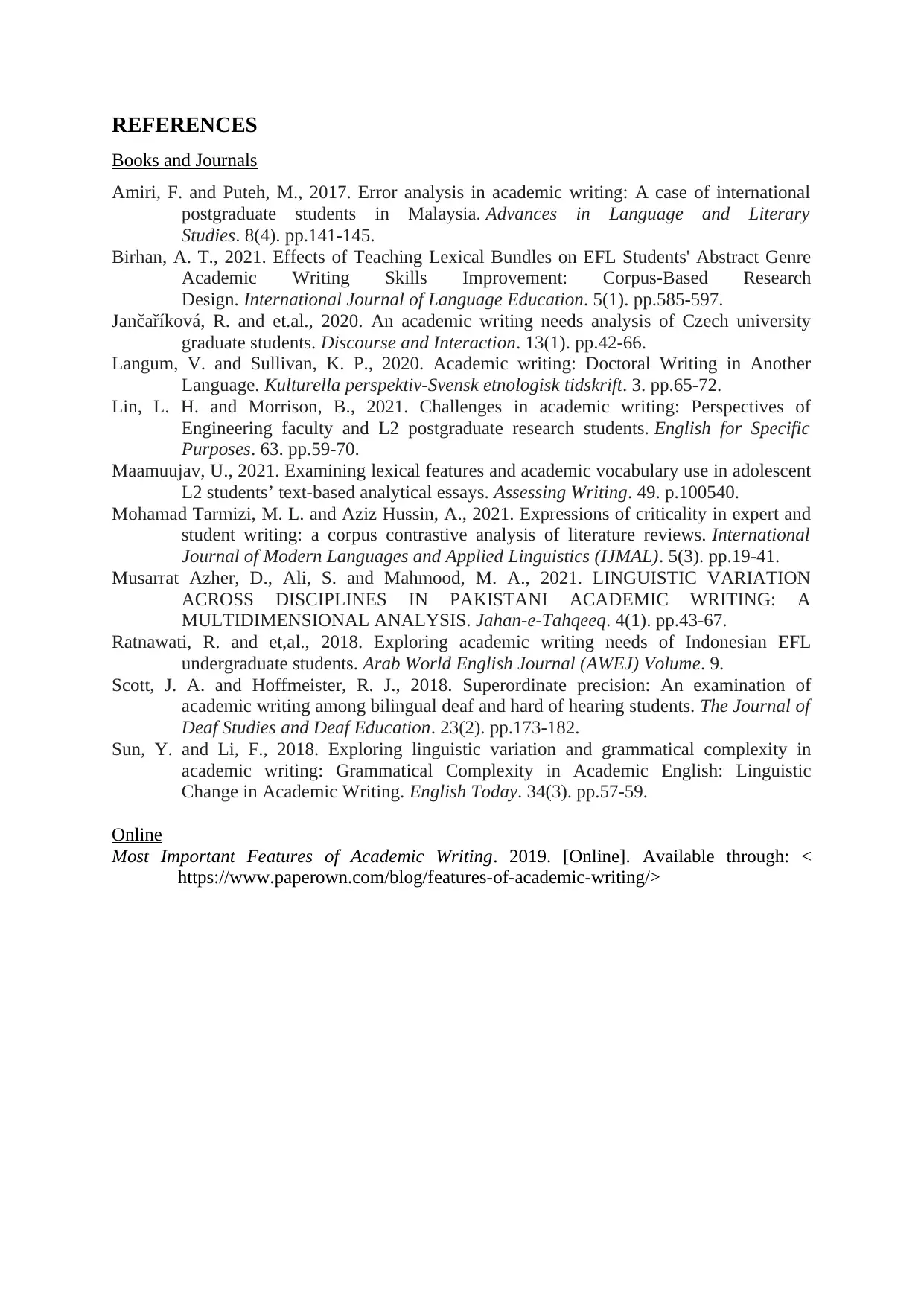
REFERENCES
Books and Journals
Amiri, F. and Puteh, M., 2017. Error analysis in academic writing: A case of international
postgraduate students in Malaysia. Advances in Language and Literary
Studies. 8(4). pp.141-145.
Birhan, A. T., 2021. Effects of Teaching Lexical Bundles on EFL Students' Abstract Genre
Academic Writing Skills Improvement: Corpus-Based Research
Design. International Journal of Language Education. 5(1). pp.585-597.
Jančaříková, R. and et.al., 2020. An academic writing needs analysis of Czech university
graduate students. Discourse and Interaction. 13(1). pp.42-66.
Langum, V. and Sullivan, K. P., 2020. Academic writing: Doctoral Writing in Another
Language. Kulturella perspektiv-Svensk etnologisk tidskrift. 3. pp.65-72.
Lin, L. H. and Morrison, B., 2021. Challenges in academic writing: Perspectives of
Engineering faculty and L2 postgraduate research students. English for Specific
Purposes. 63. pp.59-70.
Maamuujav, U., 2021. Examining lexical features and academic vocabulary use in adolescent
L2 students’ text-based analytical essays. Assessing Writing. 49. p.100540.
Mohamad Tarmizi, M. L. and Aziz Hussin, A., 2021. Expressions of criticality in expert and
student writing: a corpus contrastive analysis of literature reviews. International
Journal of Modern Languages and Applied Linguistics (IJMAL). 5(3). pp.19-41.
Musarrat Azher, D., Ali, S. and Mahmood, M. A., 2021. LINGUISTIC VARIATION
ACROSS DISCIPLINES IN PAKISTANI ACADEMIC WRITING: A
MULTIDIMENSIONAL ANALYSIS. Jahan-e-Tahqeeq. 4(1). pp.43-67.
Ratnawati, R. and et,al., 2018. Exploring academic writing needs of Indonesian EFL
undergraduate students. Arab World English Journal (AWEJ) Volume. 9.
Scott, J. A. and Hoffmeister, R. J., 2018. Superordinate precision: An examination of
academic writing among bilingual deaf and hard of hearing students. The Journal of
Deaf Studies and Deaf Education. 23(2). pp.173-182.
Sun, Y. and Li, F., 2018. Exploring linguistic variation and grammatical complexity in
academic writing: Grammatical Complexity in Academic English: Linguistic
Change in Academic Writing. English Today. 34(3). pp.57-59.
Online
Most Important Features of Academic Writing. 2019. [Online]. Available through: <
https://www.paperown.com/blog/features-of-academic-writing/>
Books and Journals
Amiri, F. and Puteh, M., 2017. Error analysis in academic writing: A case of international
postgraduate students in Malaysia. Advances in Language and Literary
Studies. 8(4). pp.141-145.
Birhan, A. T., 2021. Effects of Teaching Lexical Bundles on EFL Students' Abstract Genre
Academic Writing Skills Improvement: Corpus-Based Research
Design. International Journal of Language Education. 5(1). pp.585-597.
Jančaříková, R. and et.al., 2020. An academic writing needs analysis of Czech university
graduate students. Discourse and Interaction. 13(1). pp.42-66.
Langum, V. and Sullivan, K. P., 2020. Academic writing: Doctoral Writing in Another
Language. Kulturella perspektiv-Svensk etnologisk tidskrift. 3. pp.65-72.
Lin, L. H. and Morrison, B., 2021. Challenges in academic writing: Perspectives of
Engineering faculty and L2 postgraduate research students. English for Specific
Purposes. 63. pp.59-70.
Maamuujav, U., 2021. Examining lexical features and academic vocabulary use in adolescent
L2 students’ text-based analytical essays. Assessing Writing. 49. p.100540.
Mohamad Tarmizi, M. L. and Aziz Hussin, A., 2021. Expressions of criticality in expert and
student writing: a corpus contrastive analysis of literature reviews. International
Journal of Modern Languages and Applied Linguistics (IJMAL). 5(3). pp.19-41.
Musarrat Azher, D., Ali, S. and Mahmood, M. A., 2021. LINGUISTIC VARIATION
ACROSS DISCIPLINES IN PAKISTANI ACADEMIC WRITING: A
MULTIDIMENSIONAL ANALYSIS. Jahan-e-Tahqeeq. 4(1). pp.43-67.
Ratnawati, R. and et,al., 2018. Exploring academic writing needs of Indonesian EFL
undergraduate students. Arab World English Journal (AWEJ) Volume. 9.
Scott, J. A. and Hoffmeister, R. J., 2018. Superordinate precision: An examination of
academic writing among bilingual deaf and hard of hearing students. The Journal of
Deaf Studies and Deaf Education. 23(2). pp.173-182.
Sun, Y. and Li, F., 2018. Exploring linguistic variation and grammatical complexity in
academic writing: Grammatical Complexity in Academic English: Linguistic
Change in Academic Writing. English Today. 34(3). pp.57-59.
Online
Most Important Features of Academic Writing. 2019. [Online]. Available through: <
https://www.paperown.com/blog/features-of-academic-writing/>
Paraphrase This Document
Need a fresh take? Get an instant paraphrase of this document with our AI Paraphraser

1 out of 8
Related Documents
Your All-in-One AI-Powered Toolkit for Academic Success.
+13062052269
info@desklib.com
Available 24*7 on WhatsApp / Email
![[object Object]](/_next/static/media/star-bottom.7253800d.svg)
Unlock your academic potential
Copyright © 2020–2026 A2Z Services. All Rights Reserved. Developed and managed by ZUCOL.



